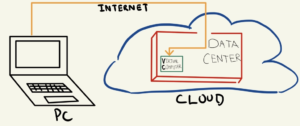The buzzword “Cloud” has become so mainstream that a lot of people have no idea what it actually is. You probably have heard the sentence: “everything is moving to the cloud”. But what are its advantages? And how can it be cheaper?
If at some point these questions have crossed your mind, this first blog is for you.
Cloud computing
When we say ‘cloud’, we actually mean ‘cloud computing’. This means that we make use of someone else’s computers and storage options. So how does that work? Well, companies like Microsoft have set up enormous data centers around the world. In these huge data centers, there are thousands of very large computers connected with thousands of very large storage devices that are all connected to the internet. Through virtualization, we can split all these computers and disks up into smaller ‘virtual computers’ that can be customized for the exact purposes we need. That might sound confusing, but let me explain this more clearly.
Paying only for what you need
For those few occasions where we have very large storage demands. we need very powerful computers to process lots of data, we end up buying very expensive computers. Most of the time we are only browsing the internet and have a few applications running. That’s a waste of money.
By virtualizing the computers in the data center, you can rent the exact size computer you need – only when you need it. This virtual computer looks and acts like the computers we use every day. With a given link you can connect to the virtual computer over the internet. Once the connection is made, you can connect to it and use it like any other computer.

Server rooms
The server room at an organization is very expensive to maintain. The room has to be at the right temperature, the machines are always running, there are complex networking devices like routers and switches which can fail at any time causing the network to fall out. These large computers are also huge investments upfront and it can be difficult to know if it will be worth it. By using the cloud – that’s all someone else’s problem.
Also, since everyone is working from home, the servers and the office network might get overloaded. This is not a problem with cloud computing. The data centers are set up in a way to deal with the fluctuating high and low demand. So the employees will always have quick access to the computers and data that they need.
You also worry less about keeping all the data safe; because losing valuable data is like losing gold. As cloud data centers are spread across the world, you can have several relatively cheap backups available in geographically separated locations. If one data center would go down due to a large power outage or natural disaster, all your data can be accessed from elsewhere in the world within minutes.
Cloud enablement
Our cloud enablement offering is focused on helping our clients make the move to the cloud (or multi-cloud) in order to achieve business agility while saving on infrastructure maintenance costs. Our main partner is Microsoft.
Cloud with Caleb
Caleb Munyasya is a DevOps Consultant working at Devoteam. In Cloud with Caleb he does a deepdive into different cloud topics. Caleb wants to understand how different tools, from Azure to Openshift, interact and how the DevOps culture can revitalize how we work – and of course automate as much as possible. He started his own webpage with the blog “Cloud with Caleb”. Take a look at this new page if you’re interested.